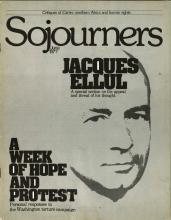It is difficult for me to comment upon the work of Jacques Ellul and its significance for Americans because of a sense I have that any remarks of mine about Ellul will be superfluous, if not self-serving.
Ellul and I have been friends for about twenty years and during that time have had a dialogue, mainly through our correspondence. We enjoy an affinity and have found much in common. In the church, we are both laymen, if somewhat disaffected from the ecclesiastical establishment. Professionally, we are both lawyers, though often uneasy about such an identification. Politically, we are both committed to representative and participatory government, consider political issues without heavy ideological passion or any similar encumbrance, and we both have some direct practical experience in public office, of roughly comparable status--Ellul, formerly, as Deputy Mayor of Bordeaux; myself, lately, as Second Warden of Block Island.
Analytically, our views are quite similar, though variously influenced by our differences of nationality and citizenship, on basic social issues like war, consumption, race, technology. We are both nonacademic theologians, and in our respective books in the realm of theological ethics there appears a very strong topical parallelism--e.g. skepticism toward natural law, the importance of the dispossessed and the oppressed, a concern for understanding the principalities and powers, attempts to elucidate the political reality of the demonic, an effort to comprehend the relationship of the apocalyptic to the eschatological, and the impact upon ethics of that relationship. I attribute this correlation in our writing to the prompting of the Holy Spirit, though some may think it mere coincidence, since Ellul and I have never had prior consultations about what each has been thinking and publishing.
Read the Full Article

